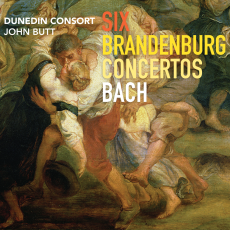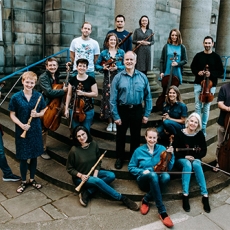Dunedin Consort - J.S. Bach: Six Brandenburg Concertos - Audio Video Club of Atlanta
The Dunedin Consort from Scotland here premiere their first purely instrumental SACD for Linn Records. The Brandenburg Concertos make an ideal choice for this bold venture, as they allow the Dunedin players to 'take it big' in the more outrageously scored Concertos 1-2, which they invest with considerable verve and vitality, while they possess the musical insight to bring out the more serious, contemplative moments in such slow movements as the 'Andante' in 4 and the 'Affettuoso' in 5.
True to their namesake, Edinburgh Castle (Din Eidyn in Scots Gaelic) the Consort give solid performances of all these works. They are a trifle rambunctious for my taste in the opening movements of Concertos 1-2, but what the hell, Bach wrote no tempo indications for either, so it is very much a matter of interpretive preference. Also, how many major works of music include a pair of hunting horns (corni di caccia) such as Bach unleashes at an opportune moment amid the small forest of woodwinds in Concerto 1? We really can't blame these players for getting in their licks while they have the chance. The pitch chosen for all these concertos (AI = 392) tends to impart a glowing warmth and solidity to the music.
The earlier numbered concertos on Side 1 tend to clip the concluding movements at the final note, rather than letting the music fade away (which I prefer). And the 'Polacca' in the middle of the 'Menuet da capo' in Concerto 1 is a little slow on the pickup.( I prefer it to follow immediately after the first part of the 'Menuet', to emphasize the surprise element.) David Blackadder's trumpet achieves its customary brilliance in Concerto 2, and consort director John Butt's harpsichord gives a thoroughly respectable if not altogether virtuosic account of the famous cadenza in Concerto 5. In Concerto 4, primo violinist Cecilia Bernardini plays with eloquence and deep feeling in the outer movements, while she provides a substantial bass when playing together with the duo of flutes in the lovely Andante movement. Elsewhere, Jonathan Manson's cello makes beautiful music sounding against the archaic timbres of the consort of viols (instruments that had already acquired a venerable 'ancient'veneer by Bach's day) in Concerto 6.
The total duration of these Brandenburgs (93 minutes) is on the brisk side, but not unnaturally so, and the Dunedin players know the right places to slow things down for best effect. In Concerto 3, the solo violin plays a short semi-cadenza as a prelude to the two chords that Bach left us in his autograph score. I find this preferable to the modern practice of interpolating the Largo from Bach's accompanied violin sonata, BWV 1021, at this point, though I still prefer having just the two 'mystery chords.' Positioned where they are, they make a perfectly satisfying mediator between two very active movements.

